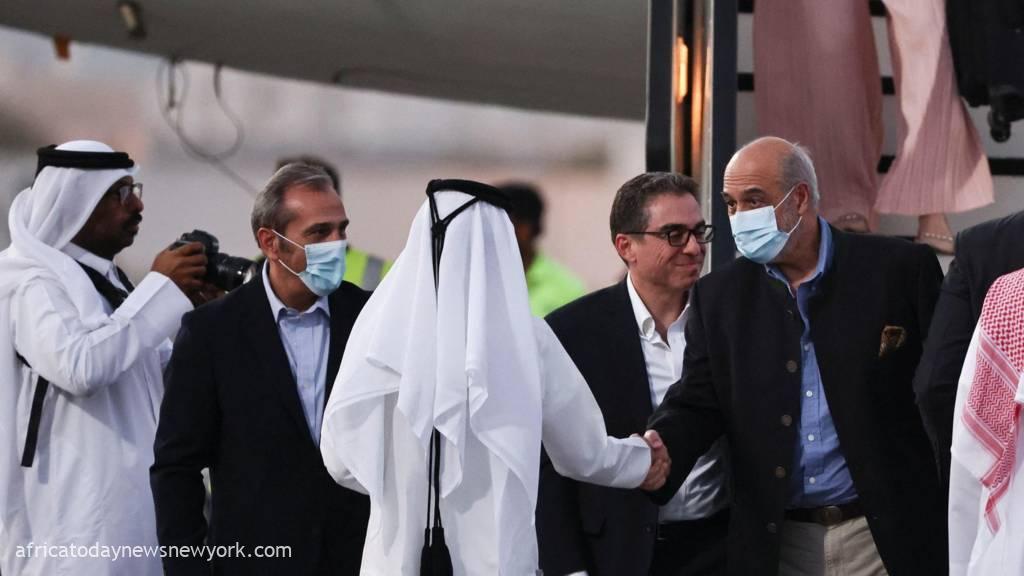The United States and Iran yesterday evening confirmed the swapping of five prisoners each in one of the arch-foes’ first deals in years as Tehran gained access to $6 billion in frozen funds in the process.
A Qatari jet took the five Americans released by Iran, including one who had been imprisoned for eight years, out of Tehran hours after the unblocked money was put in accounts run by another Qatari company.
The released inmates strolled in the fading sun on the tarmac before being transported to Washington, where some of them will have medical examinations, in a different US government plane shortly after.
Africa Today News, New York reports that the White House said Biden held an “emotional call” with families of the released prisoners, one of whom praised the president for taking the “incredibly difficult decisions” that freed them.
“Thank you, President Biden, for ultimately putting the lives of American citizens above politics,” Siamak Namazi, a businessman held since 2015, said in a statement.
Secretary of State Antony Blinken insisted the Biden administration had “no higher priority” than freeing US citizens.
“It’s very good to be able to say that our fellow citizens are free,” Blinken told reporters in New York, where he and Biden are taking part in UN meetings.
Two of the Iranian detainees returned to Tehran after transiting Doha, Iranian official media said. The other three released by the United States have opted to remain there or in a third country.
Following quiet discussions led in part by Qatar, the two countries completed the exchange after the transfer of $6 billion in funds, frozen by US ally South Korea.
The Biden administration has rejected criticism at home that it was paying “ransom,” insisting the money will be used only for humanitarian purposes, with a threat to re-freeze the funds if not.
But Iran has insisted it has full access.
The money “cruelly blocked until now and currently in the possession of the Islamic republic belongs to the people (of Iran) and we will use them to meet the people’s needs,” President Ebrahim Raisi said in New York.
Biden’s Republican rivals have roundly denounced the deal. Republican Senator Mitt Romney said it would lead to “kidnappings”.
“The idea of basically paying to release, in this effect, a hostage is a terrible idea,” he said.
Mindful of political risks, Biden in a statement said he would “continue to impose costs” on Iran.
Biden did not mention that he granted clemency to five Iranians. A US official said that all were convicted or charged with non-violent crimes, with one already set to be released soon.
Iran had generated the revenue through oil sales. South Korea froze the funds after Biden’s Republican predecessor Donald Trump withdrew from a landmark nuclear accord and imposed unilateral US sanctions on buying oil from Iran.
Iran’s central bank governor, Mohammadreza Farzin, said Tehran would seek damages from South Korea both for the delay and the reduction in value during the wait.
The five Americans of Iranian descent — all considered Iranian nationals by Tehran, which rejects dual nationality — were released to house arrest when the deal was agreed last month.
Besides Namazi, they include wildlife conservationist Morad Tahbaz, venture capitalist Emad Sharqi and two others who wished to remain anonymous. All were accused of spying or other crimes that they strongly reject.
A US official said that two more US citizens flew out of Tehran — Namazi’s mother and Sharqi’s wife, who were not in prison but had not been allowed to leave.
According to Tehran, the freed Iranians include Reza Sarhangpour and Kambiz Attar Kashani, both accused of violating US sanctions against Tehran.
A third prisoner, Kaveh Lotfolah Afrasiabi, was detained at his home near Boston in 2021 and charged with being an Iranian government agent, according to US officials.
The two others were said to have links to Iranian security forces.
The swap was the first deal sealed by Biden with Iran’s clerical rulers, who toppled the pro-Western shah in 1979 and are deeply hostile to the United States.
